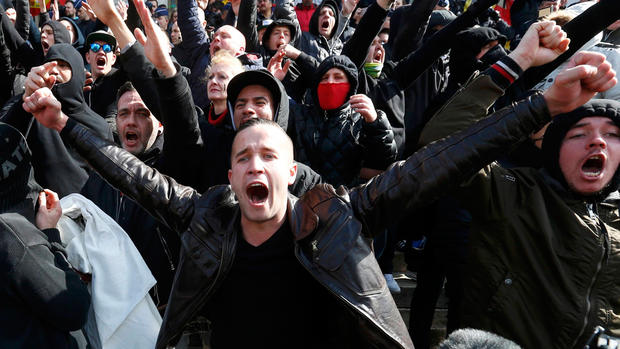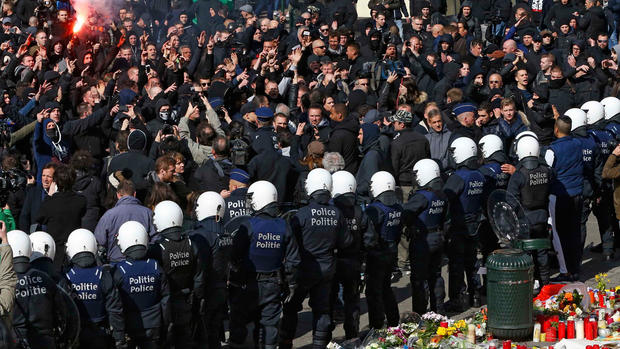Threat of extreme right march stirs fears in Molenbeek
BRUSSELS --Home to jihadists connected to thedeadly bombings in Paris and Brussels, recruiting ground for Islamic State of Iraq and Syria (ISIS) extremists, and witness to repeated police raids, Molenbeek is bracing for a new onslaught.
With extreme-right groups threatening to take the neighborhood by storm Saturday, community leaders fear its predominantly Muslim young people will fight back.
"They don't trust the police and they aren't going to take it," said Fouad Ben Abdelkader, a teacher in the neighborhood. On Thursday he joined a meeting of a couple dozen community leaders and mentors to neighborhood youths who feel adrift in mainstream Belgian society.
The group of community organizers was looking for ways to head off an escalation of violence in the largely Muslim neighborhood, hoping to avoid a situation like occurred last Sunday when hundreds of black-clad hooligans shouting Nazi slogans disrupted a memorial at Brussels' Bourse square for the 32 victims of the March 22 attacks on the airport and subway system.
This time, a relatively unknown Belgian group has pledged to "expel the Islamists" and police warn that extreme-right activists are believed to be converging on Molenbeek from around Europe, even though police banned the scheduled protest and any counter protests in the city as soon as it was announced, largely in reaction to the unrest last week.
It has been two weeks since the arrest of Salah Abdeslam, Europe's most wanted fugitive and a Molenbeek native who was found -- after four months on the run -- back home where he started.
The neighborhood has been a center for jihadi recruiters for years, and those who met Thursday are among the people who have worked the hardest to reverse the blight. But, they say, there is plenty of blame to go around for ease with which some young people are marginalized.
CBS News correspondent Vladmir Duthiers visited the area in January for a CBSN special report, "Molenbeek: Terror Recruiting Ground."
Three of the Paris attackers, including ringleader Abdelhamid Abaaoud, grew up in Molenbeek. The mayor can see the family home of two others, Salah and Ibrahim Abdeslam, from her desk.
"Here in Molenbeek you have a lot of people who are Muslim, a lot of people who are coming from Morocco. So it explains, this is one of the reasons why we have so many people in contact with radicalism, with jihadism," Mayor Francoise Schepmans told Duthiers.
Belgium provides more foreign fighters to Iraq and Syria, per capita, than any other European nation, and authorities estimate that 130 of these battle-trained extremists have returned home. Schepmans said it's the federal government's responsibility to keep track of terrorists, not hers.
"We try to get information but the fight against terrorists, it's not [on] the local level. It's [on] the federal level," she said.
The mayor's office told CBS News there are about 800 suspected jihadists in Belgium, 450 in Brussels, and 85 in Molenbeek. Brussels has a population of just over 1 million people, but it has six different police departments and 19 districts. The federal government has authority over counter-terrorism, but relies on local departments to provide on-the-ground intelligence and surveillance.
"We have four people who deal with everything that has to do with radicalism," said Molenbeek Police Commissioner Johan Berckmans. He took CBS News into a small command center where half a dozen officers keep watch over hundreds of CCTV cameras across town. The biggest problem, he said, isn't jurisdictional -- it's manpower.
"I think we work already well together, but I think we need more men -- both local and federal -- to fight the terrorist threat."
At the Al Khalil mosque, the largest and most influential in Molenbeek, Duthiers asked Imam Mohammed Tojgani why he thought so many young people in his neighborhood were turning to extremism.
"He doesn't know why they do this because it's not logic. There is no logic. There is something missing in this. They are not stable. They are not rational," Tojgani's translator said. "It gives a bad image, a false image for the people who is living in Belgium, for Muslims and for the religion."
Tojgani blamed outside forces, including violent television and the Internet for the radicalization in his community. Authorities blame each other, a lack of resources and the influx of foreign elements to their streets.
At the meeting Thursday, Molenbeek's youth organizers planned for the worst, themselves skeptical of a police force they say is unprepared and unwilling to listen to their concerns.
"There are some messages that are clearly calling for violence against Muslims. And there have been repercussions on social networks among young people, families, saying we have to get mobilized to defend our little brothers, our sisters, our mothers. Seeing that last weekend the police didn't do their job and didn't succeed in avoiding clashes, that creates mistrust," said Sarah Turine, a Molenbeek councilwoman who called the meeting in hopes of heading off problems.
Outside the non-descript building where the meeting took place, Molenbeek's weekly market filled Saint John the Baptist square and the neighborhood's central walkway -- both central gathering places, which concerned residents are contemplating blocking off for the day.
Also under consideration is simply insulating Molenbeek, closing off the streets from the outside and shutting down the neighborhood subway stops, allowing trains to pass through. But it is feared even that will not be enough.
"People who want to mix it up with hooligans will seek them out," said Hisham Nasi, a slender man with a jaunty topknot, only marginally older than the kids he has organized into a youth council.
At times shouting over one another, the group agreed that Friday prayers would be a key moment to enlist the help of families. They planned to set up a single emergency number to warn of impending disturbances. They batted around the idea of sending out text messages, Facebook posts. Anything to try and keep the peace.
"Out of 10 kids, eight will get the message," said Ben Abdelkader. But, he added, "This is a radical generation, radical in their words, radical in their actions."
They placed hope -- but little faith -- in Belgian authorities to block the groups from Molenbeek.
"For several young people, I've told them the police will keep things in hand and they have a hard time believing it," Turine said. "On Sunday there were a lot of mistakes and this time we don't have the margin for error."
Police were not at the meeting, but Turine met with them on Wednesday and secured promises that the situation was under control, and that the extreme-right troublemakers would be blocked.
And even if the protest doesn't materialize, they mused, there could be streets full of tense police and young men from the neighborhood spoiling for trouble. All it would take is one confrontation, several said, leaving the conclusion unsaid.
"I prefer to deal with the kid I know I can cope with rather than the cops who can do anything they want," Ben Abdelkader said.

